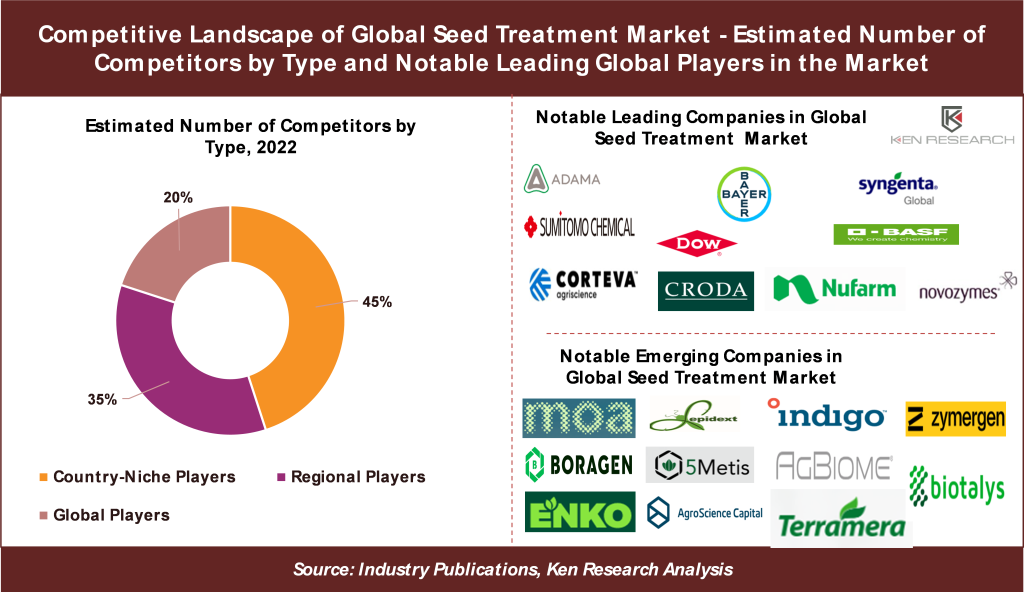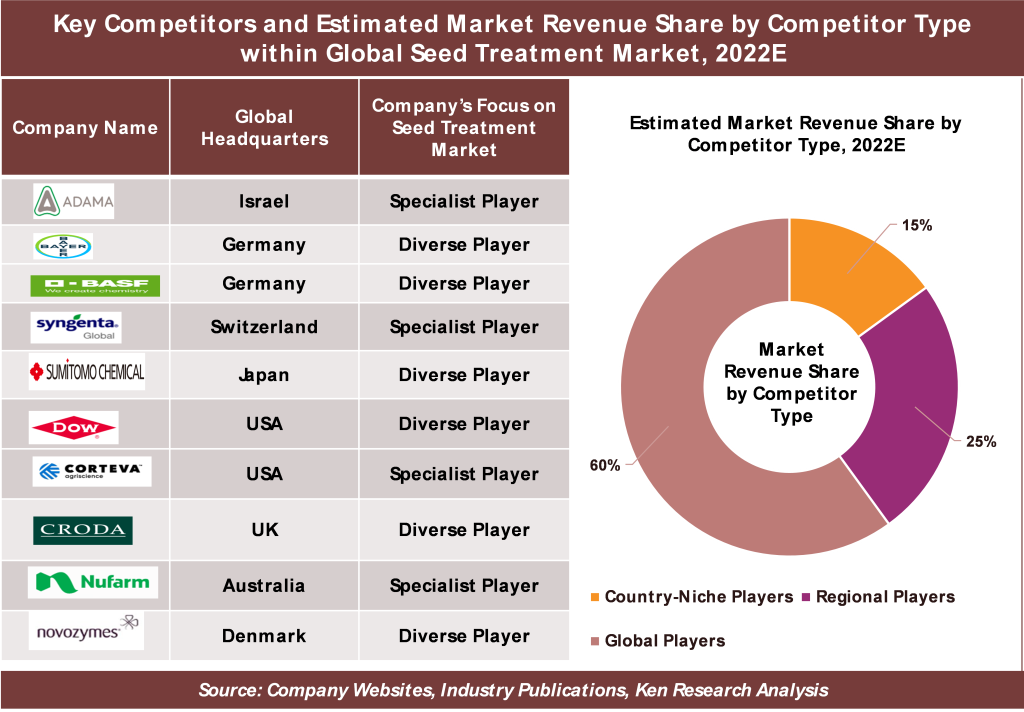Although There Are ~150 Competitors Comprising a Significant Number of Country-Niche Players and Regional Players, the Global Players Dominate the Market In Terms Of Revenue Share, Finds a Recent Study on the Global Seed Treatment Market By Ken Research
Seed treatment procedures help protect seeds from the adverse effects of pests and insects, and adverse or irregular soil and climate conditions while enhancing their quality. Seed treatment also helps in improving the germination potential of seeds so that yield loss could be minimized and food security can be ensured for a consistently growing global population. Seed treatment procedures, which can be chemical or non-chemical, apply to a range of crops, including cereals, grains, oilseeds, pulses, fruits, vegetables, and more.
Ken Research shares 3 key insights on the competitive landscape of this dynamic market from its latest research study.
- While Global Players Account for ~20% of the Total Number of Competitors, Country-Niche Companies Account for 45% Share
The Global Seed Treatment Market comprises a range of well-known global players who are leaders in the field of agro-science, agro-tech, and related products and solutions. Some of these leading global players include the likes of Bayer AG, BASF, Syngenta, Sumitomo Chemical Co., Ltd., Dow, Corteva, Croda International, Nufarm, Novozymes A/S, and more.
These large global players offer solutions in the field of agriculture biologicals, seed protection and enhancement, and more. The purpose is to help farmers and food production stakeholders leverage the optimum potential of their seeds in terms of their vigor or germination potential. At the same time, these solutions ensure that seeds get the nutrition they need and become easy to plant.
Another objective of the seed treatment products and solutions providers is to keep farming environmentally sustainable while minimizing yield loss. Among the total number of players available in the market, nearly 20% are large global players, while regional and country-niche players account for 40% each. Country-niche players are experts in providing solutions that are conducive to the specific needs of the local soil, climate conditions, and farming techniques.
- Global Players’ Continuous Investments in New Products and Solutions are Driving Revenue Growth in This Market
Despite occupying 20% of the seed treatment market in terms of the number of competitors, the global players account for nearly 60% of revenue generated in the market, followed by regional competitors (25%) and country-niche players (15%).
- Large global players active in the market boast a wide range of product lines, including herbicides, fungicides, insecticides, seed growth products, and harvest aids.
- In March 2022, Bayer’s TriVolt Herbicide was registered by the EPA as a selective corn herbicide that empowers corn growers with inherent resistance and high levels of weed control. In February 2022, Bayer launched Prosaro®PRO 400 SC Fungicide for cereal growers across the U.S. as premium protection against head scabs.
- In April 2022, BASF launched its new insecticide product, Exonus, in India, to protect largely cultivated crops such as oil seeds, pulses, and vegetables.
- In May 2022, Syngenta Seedcare launched VICTRATO®, a new seed treatment for nematodes and soil-borne fungal diseases targeted at the enhancement of crops including soybeans, corn, cereals, cotton, and rice.
Many similar innovative product launches keep driving revenue growth in the global seed treatment market.
Request for Sample Report @ https://www.kenresearch.com/sample-report.php?Frmdetails=NTk2MDEx
- Once the Initial Supply Chain Disruptions Were Over during COVID-19 Pandemic, Seed Treatment Helped Crop Production Get Back on Track
In the early days of the Covid-19 pandemic, the global seed treatment market, like many other industry verticals, suffered supply chain disruptions, especially relating to the unavailability of insecticides and fungicides. Delayed application of seed treatment products resulted in reduced germination potential of seeds in many cases. For instance, in 2019, soybean seed samples tested by Nebraska Crop Improvement Association (NCIA) exhibited 43%-98% germination, while the usual numbers ranged between 88%-98% germination in any other year.
Eventually, the seed treatment manufacturing units started operating at their usual capacity, and the situation improved adequately to ward off the negative impacts Covid-19 had on food production globally. According to the data presented by the Soybean Processors Association of India (SOPA), world oilseeds production, which had reduced by more than 3 million metric tons from 2017-2018 to 2019-2020, increased by more than 50 million metric tons in 2021-2022.
Increasing Government Initiatives is helping the Seed Treatment Market to Grow in New and Developing Economies
Geography-wise, North America occupies the largest share of the seed treatment market. Countries like the United States, Canada, and Mexico are the largest consumers of bio-pesticides, followed by the European Union. The Environmental Protection Agency in the United States actively encourages the use of biopesticides.
Along with these geographies, where seed treatment already has a well-established market presence, countries like Nigeria, Ghana, and India are also encouraging the use of treated seeds at a policy level.
For instance, in Nigeria, farmers in 13 Nigerian states were provided with enhanced quality seeds of sorghum, pearl millet, cowpea, and rice. The support initiative was launched by the Nigerian Government to help combat the adverse effects of Covid-19 on the country’s food systems.
The Food and Agriculture Ministry of Ghana also mentioned a draft policy that would help build an adequate legal, policy, and regulatory environment in the country so that it could participate actively in the global seed market.
The Government of India runs a policy-driven campaign, known as the National Mission on Seeds, to ensure that high-quality, certified seeds are easily available to farmers at a reasonable price.
For more information on the research report, refer to the below link:
Global Seed Treatment Industry: Ken Research
Follow Us
LinkedIn | Instagram | Facebook | Twitter
Contact Us: –
Ken Research
Ankur Gupta, Head Marketing & Communications
+91-9015378249




